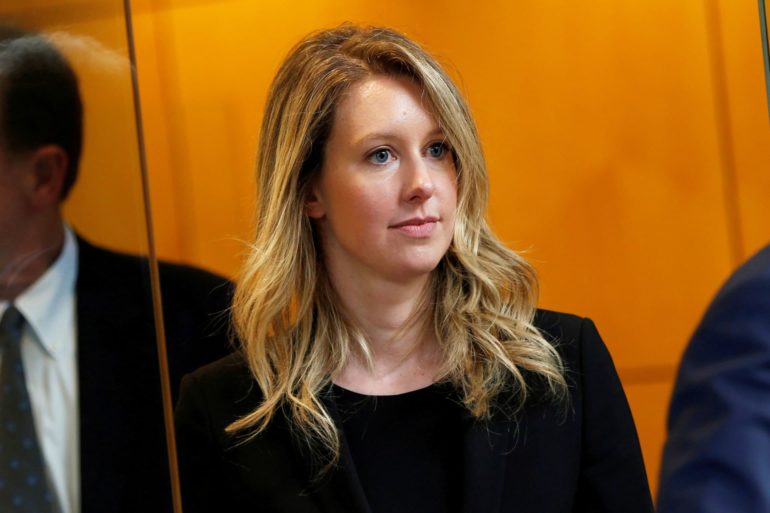Nearly a decade ago, Elizabeth Holmes was proclaimed the golden girl of Silicon Valley, and briefly crowned America’s youngest female self-made billionaire.
This week, she’ll walk into a San Jose federal courthouse with a very different image: a defendant charged accused of fraud.
Federal prosecutors in the Northern District of California have accused Holmes and Ramesh “Sunny” Balwani, former Theranos president and for a time her romantic partner, of defrauding investors and patients. They each face two counts of conspiracy to commit wire fraud and 10 counts of wire fraud. Holmes and Balwani, who will be tried separately, pleaded not guilty.
Jury selection in Holmes’ trial will begin Tuesday and is expected to take at least two days, a process that typically takes less than a day in lower-profile cases. Opening statements are scheduled for Sept. 8 and the trial is expected to last 13 weeks.
If convicted, Holmes could face 20 years in prison. Prosecutors say Holmes not only swindled investors of hundreds of millions of dollars, but she also put thousands of lives at risk.
The rise and fall of Theranos
Holmes’ saga began when she had a vision of running hundreds of laboratory tests with just a finger prick of blood. She dropped out of Stanford at age 19 to start Theranos. The idea was to make blood tests cheaper, convenient and accessible to consumers.
The company struck partnerships with Walgreens and the grocery chain Safeway. Her board of directors included luminaries such as former Secretaries of State Henry Kissinger and the late George Shultz and former Secretary of Defense James Mattis.
But Holmes’ vision turned upside down in 2015 after Wall Street Journal reporter John Carreyrou published a series of damning reports exposing the shortcomings and inaccuracies of Theranos’ technology.
Patients were given inaccurate test results relating to conditions such as HIV, cancer and miscarriages.
“She commercialized a medical product that she knew did not work, her machine only did a handful of tests that did not do them well at all,” Carreyrou said in an interview with CNBC last week.
In 2018, Holmes and Balwani were charged with “massive fraud” by the Securities and Exchange Commission. That led to Theranos being dissolved and Holmes settling with the SEC. She agreed to pay $500,000 without admitting or denying the charges. Balwani intends to fight the SEC charges.
The investors
Holmes once had some of the most powerful and wealthiest venture capitalists in America behind her healthcare start-up Theranos.
Investors such as media mogul Rupert Murdoch, former Education Secretary Betsy DeVos, the Walton family of Walmart fame, the Cox family, Patriots owner Robert Kraft and Mexican investor Carlos Slim became so enchanted with her they poured millions into Theranos.
Some of those investors are expected to testify in Holmes’ trial. All of the major investors, who doled out $700 million over the course of a decade, did not respond to CNBC’s request for a comment. Prosecutors allege the investors were swayed by exaggerations and misrepresentations of the blood-testing technology.
“When a deal turns into this, you don’t want to be on that list of investors anymore,” said Kevin O’Leary, chairman of O’Shares ETFs and a judge on CNBC’s “Money Court.”
O’Leary, who said about 20% of his investments have failed, didn’t mince words when asked about the fallout from Theranos investors.
“You can understand how embarrassing it is to get a zero like that,” O’Leary said. “Clearly means you didn’t do your due diligence which all investors know is a mistake. When there’s a really hot deal, what suffers immediately is the diligence process. You’re just questioning if you can get into the deal.”
According to the indictment, prosecutors say there were six wire transfers from unnamed investors that they allege were the result of fraudulent claims about what they were getting in return.
“It’s going to be highly scrutinized and the investors will be dragged back into the press again and shamed for it,” O’Leary said. “I can guarantee you this, it will change nothing. When this is over whatever happens, it will happen again. I guarantee nothing changes in regards to investment in Silicon Valley.”
A Silicon Valley tale
Instead of being an example of Silicon Valley’s best, Theranos turned into a black eye for start-ups.
One of Holmes’ defense strategies may be to blame the so-called “fake it ’til you make it” motto of Silicon Valley. Earlier this year, the judge ruled her defense team can lean on the hype and exaggeration of start-up founders to explain Holmes’ own actions.
“It’s going to be a wake-up call for venture capitalists and young entrepreneurs in Silicon Valley,” Carreyrou said. “If you go too far, if you push the envelope and hype and exaggerate to the point of lying, it becomes securities fraud.”
However, if she’s found not guilty, some say it could encourage risk taking.
“It’s going to a take guilty verdict to course correct and even a guilty verdict in this case might not be enough,” Carreyrou said.
Mental health defense
The documents reveal she plans to claim he psychologically, emotionally and sexually abused her. According to one filing, Holmes accused Balwani of throwing sharp objects at her, controlling what she ate, when she slept, how she dressed and monitoring her calls and text messages. Balwani denied the claims.
The court filings also revealed Holmes plans to take the stand in her own defense, a move many legal experts say is a risky one.
“It’s an uphill battle: Balwani may have exercised influence on her, due to his age or prior successes,” said Danny Cevallos, an NBC News legal analyst. “But will she convince a jury that his influence excused her own conduct?”
Today, with her trial repeatedly delayed she’s now the mother of a newborn. Holmes, who once was a ubiquitous presence in the media, stays silent and ignores reporters’ questions every time she enters and exits the courthouse.
That will all change if she does indeed take the stand to finally tell her side of the story.



